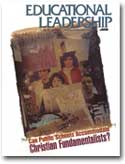Whether or not to implement outcome-based education seems to be the dominant education question before the public. But it's the wrong question for several reasons.
First, educators and reform advocates do not agree on what OBE is and how to implement it.
Second, critics use the term “OBE” to characterize virtually all school improvement initiatives. Using one term as a label, critics have the convenience of only one target to attack. Conversely, educators must defend many broad, often-irrelevant accusations.
Third, the vociferous debate over OBE can cloud an underlying issue. Critics of OBE and health education and proponents of vouchers, school choice, creationism in the curriculum, and tax limitation measures seem to be collectively advocating publicly funded private education.
The heart of the matter appears to be the need for a national debate about public versus private education and who should pay for it. What can educators do to help elevate this dialogue and illuminate other important issues?
First, choose a name and give it meaning. Decide on a name for your improvement effort, but avoid using your self-selected name without describing what you mean. If you don't provide a context, people might assume you're sloganeering without a solid plan for improved student learning. Even though your effort may eventually be labeled, you can minimize the effects of negative labels and inaccurate descriptions by communicating in plain language from the outset.
Sometimes a descriptive term, such as OBE, already has a negative connotation, putting you in a defensive position initially. But if you believe OBE is the best term to describe your improvement program, use it and debate it openly in your community. Just because a term is criticized doesn't necessarily mean you should avoid it. You will just have to work harder to explain it.
Involve the community—and listen. Include a wide cross section of your community in conversations about education in general and as it pertains to your school, district, and state. These exchanges will enrich your efforts, and community support will develop through understanding.
Remember, community conversations aren't a means to poll every resident to ask permission to do the job you've been prepared to do. Rather, they are a way to find out what your community values and is willing to commit to for the long term.
- Evaluate existing ways of communicating (written, verbal, electronic mail, informal and formal meetings, and so on). Are the ways you are sending and receiving messages effective? If not, adopt new or adapt existing forms of communication.
- Speak and write in plain language.
- Look for third-party advocates: people willing to speak up and generate support for improvement efforts.
- Ask local, state, and federal policymakers to become more effective partners in education by minimizing the focus on individual constituencies and concentrating on improving learning for all children.
- Identify ways to describe your progress so that the public can see it's holding you accountable.
- Establish good working relationships with the media, honoring their constitutional obligation to serve the public's right to information about public schools.
- Be prepared for controversy. Always be open and fair to everyone. Avoid being defensive, even though accusations may be professionally or personally insulting.
Finally, raise the real issue and depend on democracy. Don't let “to OBE or not to OBE” or “to implement or not implement efforts to improve student learning” cloud the overdue national debate about whether public education should exist or be replaced with publicly funded private education.
When the real issue is openly debated, I believe this nation will reaffirm its commitment to children and democracy. John Dewey said education is the midwife to democracy. But it's also true that democracy can be the midwife to efforts to improve education.
